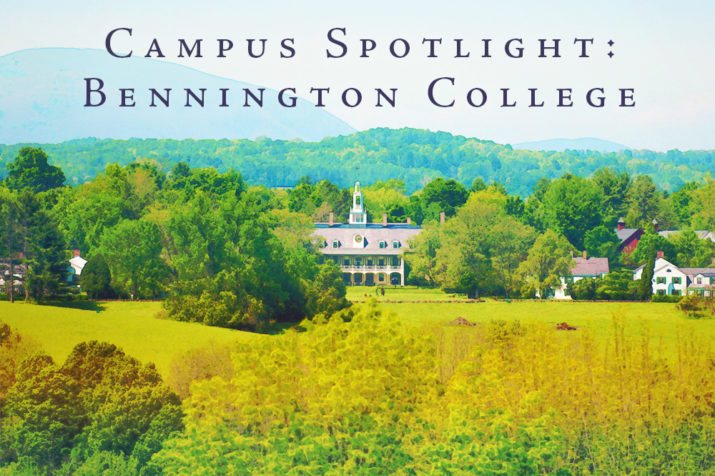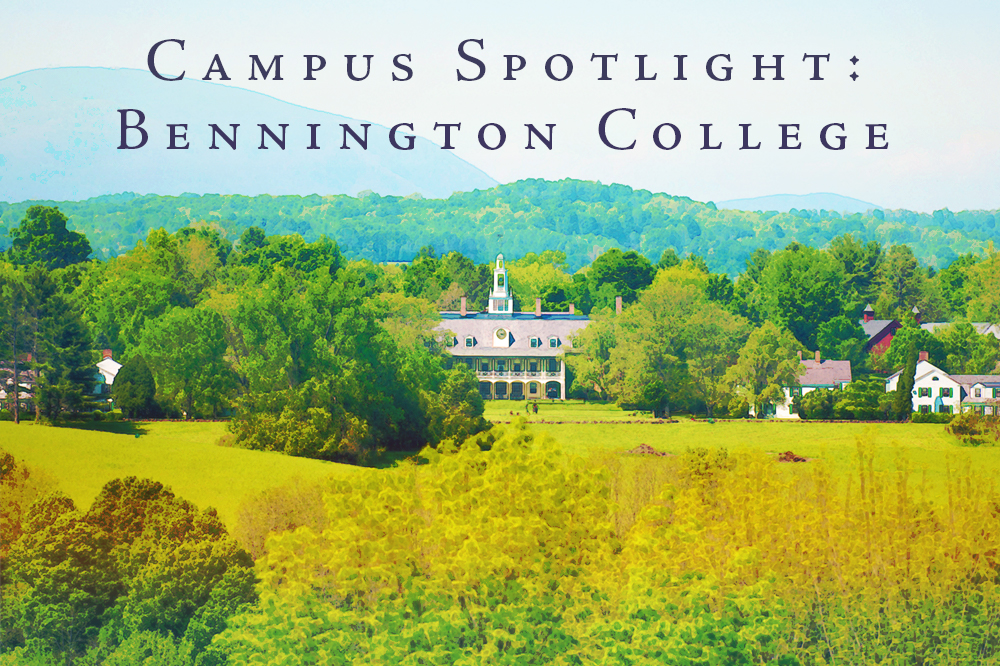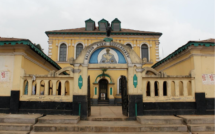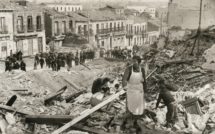

A spotlight on Bennington College.
On a hill above the village of North Bennington, Vermont, nestled between the Green Mountains and the Taconic Mountains, lies Bennington College. Walking around campus today–amid the rolling, green hills and rapidly falling leaves–one can imagine Martha Hill dancing on the grassy meadow in front of Commons, Mary Oliver looking out over the pond as she composes poems, or Karl Polanyi and Peter Drucker trudging through the snow, heatedly debating the merits of the “free market.” Today, perhaps more than ever, it is a place where it is easy to get lost in the surroundings; an island of relative calm and beauty amid a sea of instability.
But it is also a place that strives to emphasize the links between the project of liberal arts education and the realities of the world beyond. Bennington’s pedagogical ethos, nurtured by progressive reformers like John Dewey, asserts that education is “a sensual and ethical, no less than an intellectual, process.” From its inception, the college has encouraged students to follow their passions by sculpting their own plan of study, to test this education by taking it out into the world over the annual “field work term,” and to work closely with professors, in small classes and one-on-one tutorials, in order to explore different paths of study before cultivating an area of expertise.
This dialectical relationship—between theory and practice, campus and community, the liberal arts classroom and the raging crises of our current moment—shines through in the selections that follow, which center the work that Bennington students and faculty have done in partnership with the Consortium on Forced Migration, Displacement, and Education. In “Landmine Clearance, Displacement, and Interdisciplinarity,” Anthropologist Noah Coburn and his students write about their attempts to approach landmines from an interdisciplinary perspective to uncover their connections to empire and displacement and to understand their political and social significance. This work began in a Bennington classroom, but Coburn and his students, Sitashma Parajuli and Elbunit Kqiku, then undertook ethnographic research in Sri Lanka, Nepal and Kosovo. “Democracy’s Others” details the early results of a student research project that began during Summer 2020, cataloguing in real-time how the pandemic is impacting immigration politics in different areas of the world. The contributions by Soumya Shailendra, Sitashma Parajuli, and Ioanna Katsara all highlight the ways in which the very real public health crisis of COVID-19 has been weaponized against migrant communities in three distinct sites of research: India, Nepal, and Greece. In “Discovering (M)othertongues,” students Valeria Sibrian and Sarah Lore explore the making of a student-run publication focused on the complexities of translation. Weaving their unique experiences and stories into a collective examination of the hybridity that colors the contemporary, the student journal interrogates what it means to be from a place and of this world.
Our Campus Spotlight also includes two syllabi from courses taught over the Fall 2019-Spring 2020 academic year. Emily Mitchell-Eaton’s “Dying in Diaspora” took up topics that are all too-timely, uncomfortable to consider, full of ethical minefields but nonetheless integral to our lives, yet absent from most of our discussions: grief, mourning, and death. With great care and reflexivity, Mitchell-Eaton prompts students to ask, with Judith Butler, “when is life grievable?” More broadly, how do power and politics intervene in these most intimate areas of life, particularly for displaced populations? Joseph Alpar and Kerry Ryer-Parke’s course, “Sounding Home,” brought together the instructors’ respective expertise in ethnomusicology and peacebuilding to explore the relationship between music and migration. Originally designed as a partnership with an Albany-based refugee-support organization, the instructors adapted to the constraints of COVID-19 by building in a virtual speaker series and student playlists, three of which are featured alongside the syllabus. Collectively, the contributions highlight some of the many ways that the topic of migration and displacement is approached at Bennington College. They have in common an emphasis on interdisciplinarity, a creative reimagination of the traditional liberal arts classroom, and an encouragement of deep reflection leading to action in the world.
-
“Landmine Clearance, Displacement, and Interdisciplinarity” by Noah Coburn, Sitashma Parajuli, Elbunit Kqiku
-
“Democracy’s Others: Migrating in a time of COVID-19” by John Hultgren, Soumya Rachel Shailendra, Sitashma Parajuli, and Ioanna Katsara
-
“Discovering (M)othertongues: A Reflection on the Conception of a Student-Run Publication” by Valeria Sibrian and Sarah Lore
-
“Syllabus: Dying in Diaspora” by Emily Mitchell-Eaton
-
“Syllabus: Sounding Home: Music of Migration, Memory, and Exile” by Joseph M. Alpar and Kerry Ryer-Parke
John Hultgren teaches politics at Bennington College. He directs Bennington’s engagement in the Consortium on Forced Migration, Displacement, and Education, and also helps to coordinate the college’s Environmental Studies program. He is the author of Border Walls Gone Green: Nature and Anti-immigrant Politics in America (University of Minnesota Press, 2015).
Published on October 13, 2020.




